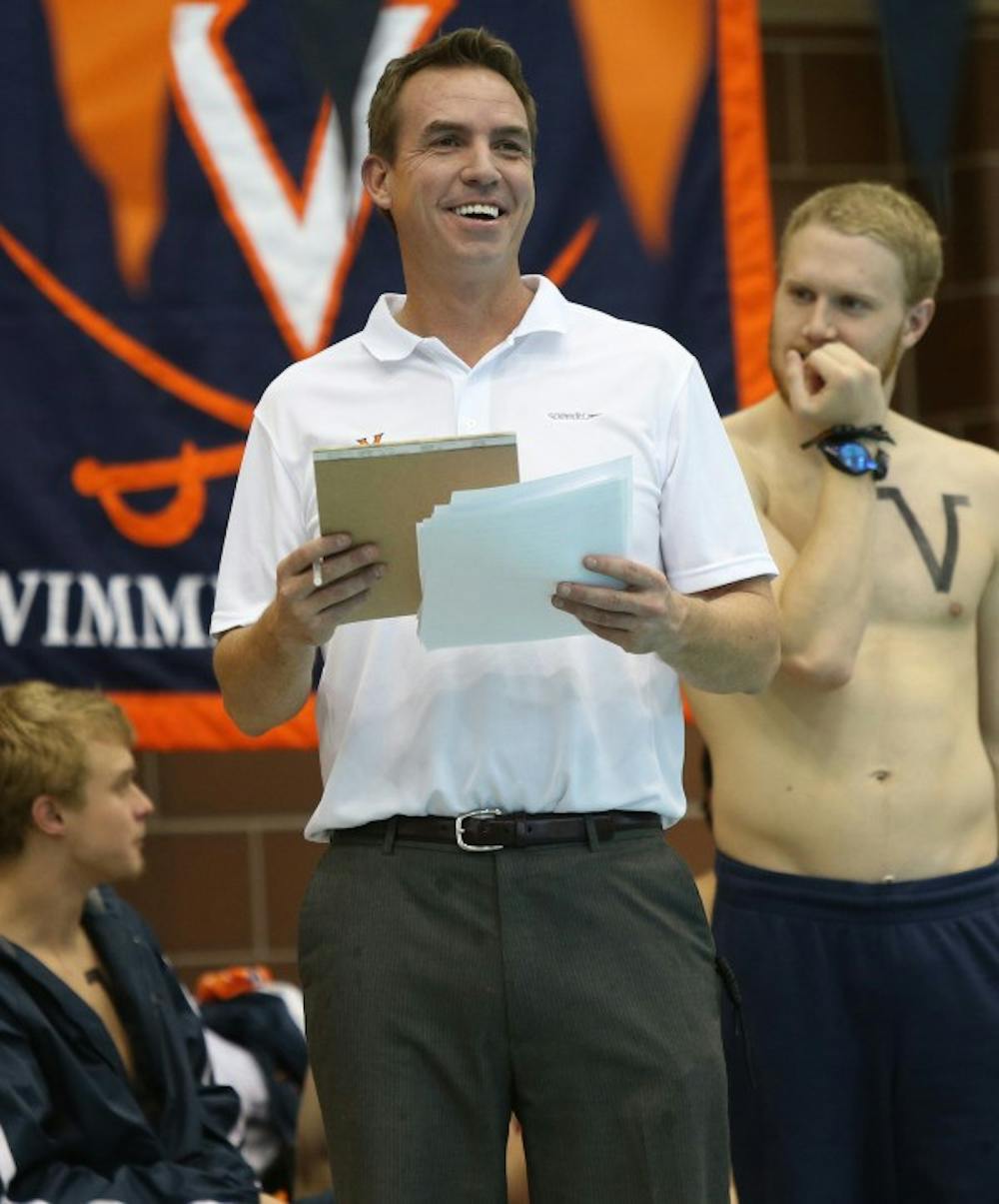As a sports coach, succeeding a legend is one of the toughest jobs, especially in collegiate athletics. Some do it gracefully — see Jimbo Fisher taking over for Bobby Bowden at Florida State — while others seem to succumb to the pressure — think Lane Kiffin at USC after Pete Carroll’s departure.
But the pressure never bothered Virginia swimming and diving coach Augie Busch when he took over the program in 2013 from the legendary Mark Bernardino, who left under ambiguous circumstances. As the swim and dive beat writer for The Cavalier Daily the past two seasons, I learned this first hand in 2013.
I was assigned to write a feature on the new coach before his debut in Charlottesville, Virginia, where the Cavaliers were set to host a quad-meet with Penn State, Texas and West Virginia.
Naturally, I asked him about how he felt succeeding a 31-time ACC coach of the year. After throwing in a few good words about Bernardino, he told me this:
“I think I can take [the program] to even higher territory. Certainly on the national stage, I feel like we can be better than we have ever been.”
That was a season ago. Then just last weekend, his women’s team took fifth place at the NCAA meet — the best finish in program history.
Mission accomplished.
Even so, Busch left the meet with a little more to be desired. Entering the 400-yard freestyle relay, the final event, the Cavaliers were sitting in fourth place, poised for a podium finish and an NCAA trophy to add to its hoard of conference hardware.
But Texas A&M placed fourth in the event, just enough to edge out Virginia by two points. Still, Busch knew the significance of what he and his team had accomplished.
“I’m not going to lie, it was disappointing in the end to give away fourth place,” he said. “But fifth place is a pretty sweet consolation prize.”
He’s right. It certainly was.
The headliner from the meet was sophomore Leah Smith, who won individual national championships in the 500 and 1,650-yard freestyle. In addition, she broke the NCAA record for the 500 free with a preliminary time of 4:30.37 before the finals.
But just as impressive as the performance itself was her reason behind it.
Throughout the season, the Pittsburgh native carried a chip on her shoulder after failing to qualify for the A final in the 500 free at last year’s NCAA meet.
“It just really disappointed me [last year] that I wasn’t able to get as many points for my team as I thought I should have,” Smith said.
And that team-first attitude has been one of the themes behind this season’s historic success for the women’s program. While Smith’s post-race comments give the casual observer a look into this culture, no other swimmer exemplifies this mindset more than junior Courtney Bartholomew.
A five-time All-American entering the meet, the backstroke specialist seemed poised to finally break through and win her first national championship.
“She thought she could win the 100 [back],” Busch said. “We all did.”
And if she had swum the time she posted at the Georgia Fall Invitational earlier this season, 50.01 seconds, she would have.
But in addition to her signature events, the 100 and 200 back, Bartholomew took part in four of Virginia’s five relay teams as well as the 200-yard individual medley.
In the 100 at the NCAA championships, the Holland, Michigan native posted a time of 50.51 – good for second place. She added a second-place finish in the 200 back and a fifth-place finish in the 200 IM and was part of the second-place 400-medley relay team. But the fatigue from those extra races might have dashed her chances at a national championship.
“She was just going to suck it up for the team,” Busch said. “If that impacted her individual swims, then that was what it was going to do.”
That is what Busch expects from his swimmers — an unquestioned team-first mentality. And that is a major reason why the women’s team has been so successful the last two seasons.
Of course, for all his accomplishments with the women’s team, the men’s squad has not fared quite as well under Busch’s tenure in a much-improved ACC. And he will be the first to tell you so.
But he will also be the first to prop up many of the young swimmers he feels are the future of the program, such as sophomore Austin Quinn, and praise his finest athletes — like Olympic hopeful junior Yannick Kaeser.
While his men have not reached nearly the level of success as his women he said he believes they will get there.
And this NCAA finish by the Lady Cavaliers will be a huge step in the right direction. Busch’s training regimen — considered by some to be unconventional, as he leans heavily on dry-land training and essentially disregards conference meets for his NCAA swimmers — has worked to perfection with the women. And if he can effectively parlay his message on the recruiting trail, it can work with the men.
After all, a top-five NCAA finish is new territory for the program. And next season, with the help of Busch and his staff, the women, once again, seem poised to rise even higher.
“I believe our women will go into next season exactly how they went into this season,” Busch said. “They’ll have a stated goal of being the best team in the history of the program.”
I wouldn’t bet against them.





